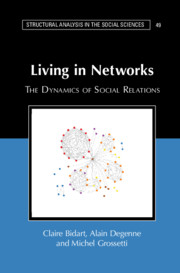Book contents
- Living in Networks
- Structural Analysis in the Social Sciences
- Living in Networks
- Copyright page
- Contents
- Figures
- Tables
- Preface
- Acknowledgments
- Introduction
- Part I Foundations of a Sociology of Relational Dynamics
- Part II Networks and Their Dynamics
- Part III Networks and Social Worlds
- Conclusion
- References
- Index
- Structural Analysis in the Social Sciences
Conclusion
Published online by Cambridge University Press: 27 October 2020
- Living in Networks
- Structural Analysis in the Social Sciences
- Living in Networks
- Copyright page
- Contents
- Figures
- Tables
- Preface
- Acknowledgments
- Introduction
- Part I Foundations of a Sociology of Relational Dynamics
- Part II Networks and Their Dynamics
- Part III Networks and Social Worlds
- Conclusion
- References
- Index
- Structural Analysis in the Social Sciences
Summary
All of these analyses raise the question of the inclusion of networks in society: do networks reproduce inequalities, do they possibly reinforce them, or do they still offer small spaces for "play" among social constraints and divisions? Do they constitute for the social sciences an intermediate level of observation, or a relatively autonomous dimension of social life, bearing its own logic and its own dynamics? We have tried here to shed light on some of these dynamics, as part of the implementation of the principles of a relational sociology.
Information
- Type
- Chapter
- Information
- Living in NetworksThe Dynamics of Social Relations, pp. 301 - 306Publisher: Cambridge University PressPrint publication year: 2020
